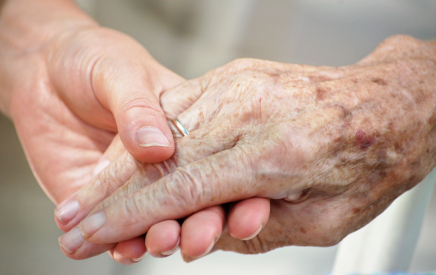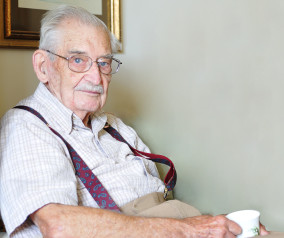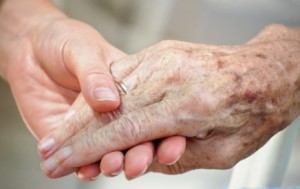Category: Anecdotes
Posted by Dr. El - October 7, 2018 - Anecdotes, Depression/Mental illness/Substance Abuse, McKnight's Long-Term Care News, Personal Reflections, Role of psychologists, Something Good About Nursing Homes

Here’s my latest article on McKnight’s Long-Term Care News:

“No,” Diane said when I showed up at her door for our Thursday session. “I don’t want to talk to you. I’m too aggravated.” She turned her head and looked out the window for a moment.
“I’m surprised.” I replied. “We had such a nice conversation the last time. Plus, being aggravated is a perfect reason to talk to the psychologist.”
She looked back at me and sighed with exasperation, “Fine! Sit down. But I’m not going to be very good company.”
“You don’t have to be a star, baby, to be in my show.” I sang the refrain to the old song, mostly on tune.
She rolled her eyes. “They’re driving me crazy here,” she began, launching into an account of her recent fall on the way to the bathroom. “And now they won’t let me do anything by myself! They’re always yelling at me to wait for them, but then they don’t come when I call for them.”
It was the same tale I’d heard from two residents in my other facility that week.
********
Maya was a frail woman in her late 70s who navigated around her room with a walker. She spent most of her time alone, crocheting colorful booties that she carefully tied onto the walker frame, which served as a display for her wares.
“Five dollars each,” she told me, when I commented on her handiwork. Her earnings, I learned several sessions later, were going to her disabled son, who came to the nursing home every few weeks to collect the money she’d made for him. “He’s a good boy,” she assured me.
Maya had been placed on the dementia unit, though she didn’t have dementia. Residents wandered in and out of her room, touching her yarn and the slippers. She yelled at them to stop, leading to chart notes saying she was agitated and eventually to a move to a different floor.
Once among residents more similar to herself and assigned to a consistent, experienced aide who took her under her wing, Maya’s mood and behavior improved considerably and we discussed concluding our sessions. I arrived for our last meeting with a $5 bill in hand and left with a beautifully crocheted pair of booties I didn’t need.
For the entire article, visit:

yarn in apile
Posted by Dr. El - December 7, 2017 - Anecdotes, End of life, McKnight's Long-Term Care News, Personal Reflections

Here’s my latest article on McKnight’s Long-Term Care News:

I lost one of my two mothers-in-law last Monday, five weeks after she was diagnosed with pancreatic cancer. We had expected Audrey to reach 100 years of age, like her mother, but she died shortly after her 91st birthday, having spent her 90th year traveling and doing water aerobics three times a week.
Audrey had filled a hole in my life left after the death of my beloved great-aunt many years ago. Whenever I phoned my MIL, she’d answered the phone with a chipper, “Oh hello, Darling!” Emails began with the salutation, “Dear Heart,” before launching into the latest goings-on at the CCRC where she was the head of several resident programs.
After her diagnosis, she enlisted peers to take over her responsibilities, giving them her notes and training them as if they were new employees. She considered beginning a program at the care center during her brief stay, “Can you believe they don’t recycle here? I’m going to make some calls and see if we can get that started.”
She spent her last weeks shipping sentimental items to various relatives and, when she became too weak, she began instructing her sons to do the same. A steady stream of family members and friends came to say goodbye to her as she sat in her bedside chair with her makeup on and a scarf neatly tied around her neck.
It was exactly the way I’d want to go if I could have my choice.
In the days after she died, I phoned her sons and notified family members on our side of the family. I called a few of my friends and tried to get extra sleep. I confirmed my parents’ upcoming lunch invitation. I spent quality time with the cat, and with my family. I ate some chocolate.
For the entire article, visit: Elder love

Posted by Dr. El - September 28, 2017 - Anecdotes, Business Strategies, Communication, Customer service, McKnight's Long-Term Care News, Resident care, Stress/Crisis management

Here’s my latest article on McKnight’s Long-Term Care News:

Both of my mothers-in-law live in long-term care communities in Florida. (I’ll keep the backstory about having two MILs a mystery.)
One MIL lives in a place that was excellent about how they communicated with family members before, during and after Hurricane Irma. The other MIL’s facility handled that aspect of care poorly.
At Bentley Village in Naples on the southwest coast of Florida, all 800 residents of the CCRC were evacuated in advance of the storm, even when everyone thought the hurricane was heading toward the East Coast. While not every organization can afford to evacuate their residents to plush hotels, all of them can afford to do what Bentley did next.
At the top of the home page of its website they placed a bright red banner instructing site visitors to click upon it for more information on Hurricane Irma. The following page contains continually updated reports on the progress the management is making toward assessing and repairing the damage to their homes, as well as an estimate of how long the process will take. A typical entry contains the date and time of the posting, the work that’s been done and what has yet to be accomplished.
They recently added photographs of the damage to the community. The photos clearly show even those most eager to return to their homes why they must wait.
In addition, there’s a list of locations where people are sheltering since residents from skilled nursing, assisted living and independent living were sent to different locales. A pet-friendly hotel was selected for independent living residents with animals.
When I discovered my MIL’s cell phone wasn’t working, I checked the website, got the phone number of the hotel where she was staying and was immediately connected to her room. She claimed they were “having a ball.”
Very reassuring.
For the entire article, visit:

Posted by Dr. El - October 4, 2016 - Anecdotes, Depression/Mental illness/Substance Abuse, Inspiration, Role of psychologists

 Mabel was in her late 80s, had lost a leg to diabetes and didn’t hear well. She’d been suicidal upon her admission to the nursing home, but the team had worked hard to stabilize her mood. Months later, she wasn’t exactly happy, but she and Liza, her young private aide, attended activities together and she no longer thought she’d be better off dead.
Mabel was in her late 80s, had lost a leg to diabetes and didn’t hear well. She’d been suicidal upon her admission to the nursing home, but the team had worked hard to stabilize her mood. Months later, she wasn’t exactly happy, but she and Liza, her young private aide, attended activities together and she no longer thought she’d be better off dead.
I focused on her strengths when I was with her, appealing to her best self and trying to coax her out of her negativity. I frequently updated her on the news, giving her a report tailored to her interests.
“What do you think of this, Mabel?” I asked, sharing the latest events on the presidential election.
“I think it’s disgusting,” she replied.
“So are you ready to vote when they come around with the absentee ballot?”
“I’m not going to vote.”
“What?! Why not?” I asked, genuinely shocked.
“I’m not going to be alive to see it. Why should I care?”
“What about me?! What about Liza? She’s been awfully nice to you. Surely you can vote for Liza.”
Mabel paused and considered. “Yes. I can vote for Liza.”
A few days later I saw Liza and Mabel out of her bedroom talking to some other residents. Mabel was animated and actually smiling, a rare occurrence since I’d known her.
I’m sure a number of things contributed to Mabel’s shift in mood, but I have no doubt that recognizing her continued value as a citizen and having the opportunity to help Liza were among them.
Posted by Dr. El - July 28, 2016 - Anecdotes, Depression/Mental illness/Substance Abuse, Personal Reflections, Role of psychologists

When psychologists provide direct care services to long-term care residents, a note is required for every session, documenting symptoms, therapeutic interventions and other information proving that each and every session is medically necessary. The goals and progress of treatment are reviewed every three months. Audits and case reviews by insurers are not uncommon. Other disciplines in the organization read the notes and can incorporate the work into their efforts or, occasionally, question why the resident is being seen.
Sometimes, particularly when I haven’t had a vacation for a while, I wonder if I’m being truly helpful. I don’t want to discontinue treatment too soon because often mine is the only consistent, deep contact a resident has in life, but the steady drumbeat of needing to prove it’s worth it can lead to doubts at times.
Luckily, my residents have a way of letting me know that my services make a difference to them.
I was considering discontinuing treatment with a somewhat confused woman. When I woke her from a nap the other day, she smiled broadly, pointed to my business card which she keeps by her nightstand and almost leaped out of bed to talk to me. She spent the session following up on topics we’d been addressing in previous sessions and proudly showing me her progress on activities in which I’d encouraged her to engage.
I’ll keep going with her a while longer.
Another resident approached me in the hall recently, saying he’d been waiting for me and telling me, “You give me a reason to live.”
I’d consider that medically necessary, wouldn’t you?

Posted by Dr. El - February 25, 2016 - Anecdotes, Common Nursing Home Problems and How Psychologists Can Solve Them, Personal Reflections, Role of psychologists


Like many of my residents over the years, Virginia had been a nursing assistant prior to her retirement. In our early sessions, I encouraged her to discuss how it felt to be “on the other side of the stethoscope,” as I put it, but she was too focused on the plot to steal her home.
I spoke to her social worker about it. “I’m not sure if Virginia is going to benefit from therapy because she’s pretty confused, but is there any reality to her worry about her house?”
Her social worker sighed. “I was hoping when she first got here that she could go home, but her daughter is selling her house so that’s not going to happen.”
I could see how that could be interpreted as theft.
I kept meeting with Virginia, making mental notes on how much time in each session was spent on agitated theories versus reasonable discussion of confirmable events. I met her comments about plots with empathy and redirection; I greeted her reports on attending activities with enthusiasm. Our early meetings were about 90% agitation and 10% reality, then 80/20, then 70/30. We were making progress.
A minor health crisis proved mentally beneficial. We discussed her doctor’s recommendations, things she could do to take care of herself and what to expect when she went to the hospital for her medical procedure. The conversation was now 80% reality.
The week after her return from the hospital, she expressed concern about her roommate. “Tell them to check her for a rash. I thought I noticed something last night.”
They checked. There was nothing. But Virginia the nursing assistant was back.
Posted by Dr. El - February 11, 2016 - Anecdotes, Common Nursing Home Problems and How Psychologists Can Solve Them, Personal Reflections, Role of psychologists

 The first time I met 87-year old Virginia, it was immediately apparent why the nurses had made the referral. She spoke too quickly, words pouring out one after the other without pause. She had vague theories that a staff member was trying to steal the house she’d vacated a few months ago and attempting to steal her boyfriend as well. She couldn’t identify which staff member it was, nor could she recall what day it was or the name of the United States president. “He’s got a wife and two kids, I remember that much,” she told me.
The first time I met 87-year old Virginia, it was immediately apparent why the nurses had made the referral. She spoke too quickly, words pouring out one after the other without pause. She had vague theories that a staff member was trying to steal the house she’d vacated a few months ago and attempting to steal her boyfriend as well. She couldn’t identify which staff member it was, nor could she recall what day it was or the name of the United States president. “He’s got a wife and two kids, I remember that much,” she told me.
Her gray hair was orange at the ends, giving her an unfortunate clown-like air; the flowers on her hat emphasized this effect. Her fingernails had been painted red weeks ago with only small bits of color remaining. She lifted up her floral shirt despite my protests to show me that she had no bra in her clothing collection.
“Do you think I’m crazy?” she asked with concern at the end of the interview.
“I think you’ve got a lot going on,” I demurred, “and I’d be happy to try to help you sort it out.”
“I wish you would,” she replied, satisfied.
Posted by Dr. El - January 28, 2016 - Anecdotes, For Fun, Inspiration, Something Good About Nursing Homes

 It was the third week I was meeting with Mr. Schwartz, an 85-year old man with a thick mustache and a penchant for suspenders. I found him watching TV in the dayroom, surrounded by some of his peers. I crouched by his wheelchair so I could speak to him at eye level.
It was the third week I was meeting with Mr. Schwartz, an 85-year old man with a thick mustache and a penchant for suspenders. I found him watching TV in the dayroom, surrounded by some of his peers. I crouched by his wheelchair so I could speak to him at eye level.
“Hi Mr. Schwartz, I came by to see how you were doing. Can we talk in your room for a while?”
“Sure, young lady!” he replied without hesitation, seeming eager to see me despite not being able to recollect my name.
“I can give you a push to your room,” I offered. “It might be easier since you’re holding that cup of tea.”
“Tea!” Mr. Schwartz exclaimed, with mock astonishment. “I thought it was beer!”
I laughed heartily and he smiled with pleasure.
Posted by Dr. El - January 11, 2016 - Anecdotes, Personal Reflections

As I was rushing past the nursing station, Sophia, a 93-year old woman wearing a red velour sweatsuit, was sobbing and calling out for help. She was sitting among a row of other residents who were watching television and passersby.
 “What’s the matter?” I asked, stopping to kneel by her wheelchair.
“What’s the matter?” I asked, stopping to kneel by her wheelchair.
“I want someone to put me
back to bed,” Sophia replied. “I’m so tired.”
“I’ll find someone to help you,” I reassured her. “It might take a little while, but someone will put you back to bed.”
I looked up, scanning the area for an aide or nurse. My eyes met those of a 30-something uniformed delivery man waiting for the elevator. “I bet you must run out of here at night,” he commented. His hardened voice held fear and disgust.
“Actually,” I told him matter-of-factly, “I like it a lot.”
With that, his face relaxed and his tone softened. “I’m really glad to hear that,” he said, sounding relieved. He looked around the room with what seemed to be a new perspective on the situation. The elevator doors opened. “Have a good day!” he called out, smiling.
I found the charge nurse and let her know about Sophia’s need to get back to bed. When I came back to the nursing station again a little while later, Sophia had returned to her room.
Posted by Dr. El - November 23, 2015 - Anecdotes, Inspiration, Personal Reflections, Role of psychologists, Something Good About Nursing Homes

Here’s my latest article on McKnight’s Long-Term Care News:

At a conference last week, I remarked to my audience of recreation therapists, “None of us went into this field for the money — we did it for the juice.” And by “the juice,” I mean the good feeling we get from helping seniors and the nice things they say to us in return.
This is why your employees stay, despite everything else.
To get us in the spirit of gratitude for Thanksgiving, I’ve included a sample of comments made by residents to their psychologists. (I solicited material from my colleagues in my favorite shrinky organization, Psychologists in Long-Term Care. I actually heard some of them at work myself, but I’m not gonna tell you which ones.)
• “Without you, I’m like a ship without a rudder.”
• “Girl, I am so happy to see you. I love your smiling face. You help me so much when you come. I don’t feel so crazy.”
• “Thank you for listening to me & not giving up on me.” (Written on a “Wow!” card.)
• “I know you understand. I’m not crazy, but sometimes I feel like I am. My family doesn’t get it and the girls here don’t have time to talk to me.” (LTC Alzheimer’s resident with pain issues.)
• “You help me to look at my life here in a way that my family, friends, and nursing staff can’t.”
• “You don’t know how much it helps to have someone come in and listen and talk to me! I’ve just felt lost. I know I forget things, but since you’ve been coming, it seems like I’m less befuddled!” (LTC resident with early onset Alzheimer’s disease.)
For the entire article, visit:











 Mabel was in her late 80s, had lost a leg to diabetes and didn’t hear well. She’d been suicidal upon her admission to the nursing home, but the team had worked hard to stabilize her mood. Months later, she wasn’t exactly happy, but she and Liza, her young private aide, attended activities together and she no longer thought she’d be better off dead.
Mabel was in her late 80s, had lost a leg to diabetes and didn’t hear well. She’d been suicidal upon her admission to the nursing home, but the team had worked hard to stabilize her mood. Months later, she wasn’t exactly happy, but she and Liza, her young private aide, attended activities together and she no longer thought she’d be better off dead.



 The first time I met 87-year old Virginia, it was immediately apparent why the nurses had made the referral. She spoke too quickly, words pouring out one after the other without pause. She had vague theories that a staff member was trying to steal the house she’d vacated a few months ago and attempting to steal her boyfriend as well. She couldn’t identify which staff member it was, nor could she recall what day it was or the name of the United States president. “He’s got a wife and two kids, I remember that much,” she told me.
The first time I met 87-year old Virginia, it was immediately apparent why the nurses had made the referral. She spoke too quickly, words pouring out one after the other without pause. She had vague theories that a staff member was trying to steal the house she’d vacated a few months ago and attempting to steal her boyfriend as well. She couldn’t identify which staff member it was, nor could she recall what day it was or the name of the United States president. “He’s got a wife and two kids, I remember that much,” she told me.
 It was the third week I was meeting with Mr. Schwartz, an 85-year old man with a thick mustache and a penchant for suspenders. I found him watching TV in the dayroom, surrounded by some of his peers. I crouched by his wheelchair so I could speak to him at eye level.
It was the third week I was meeting with Mr. Schwartz, an 85-year old man with a thick mustache and a penchant for suspenders. I found him watching TV in the dayroom, surrounded by some of his peers. I crouched by his wheelchair so I could speak to him at eye level. “What’s the matter?” I asked, stopping to kneel by her wheelchair.
“What’s the matter?” I asked, stopping to kneel by her wheelchair.
